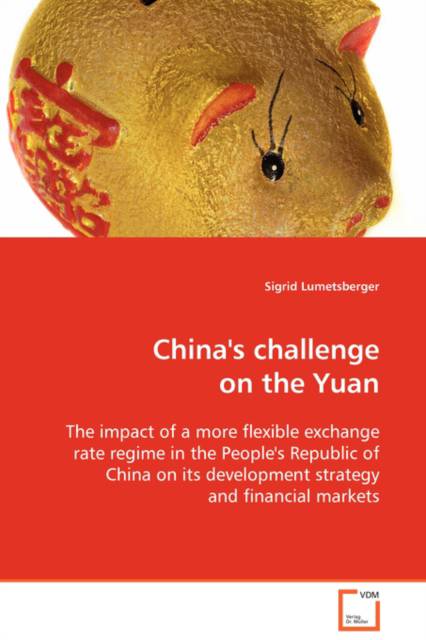
- Afhalen na 1 uur in een winkel met voorraad
- Gratis thuislevering in België vanaf € 30
- Ruim aanbod met 7 miljoen producten
- Afhalen na 1 uur in een winkel met voorraad
- Gratis thuislevering in België vanaf € 30
- Ruim aanbod met 7 miljoen producten
Zoeken
China's challenge on the Yuan
The impact of a more flexible exchange rate regime in the People's Republic of China on its development strategy and financial markets
Sigrid Lumetsberger
Paperback | Engels
€ 86,45
+ 172 punten
Omschrijving
The introduction of the renminbi to the People s
Republic of China in 1949 led to much domestic market
distortion. It was only in the beginnings of the
1980s when finally the economy witnessed a
spectacular progress. This advancement introduced the
ever-growing presence of China s products to the
international marketplace and the development of the
Chinese domestic market. Since these first steps to
the international scene criticism has not been kept
short on its monetary policy. The common argument
was, and still is, that by keeping the renminbi
undervalued and ensuring the competitiveness of
Chinese exports, the main trading partners suffer
from negative implications on their Balance of
Payments. By July 2005, the Chinese authorities made
the first significant move towards a more flexible
exchange rate regime with the introduction of a
basket peg. Nevertheless, this move has not
substantially changed the public opinion. Taking the
Chinese domestic market and its international
importance into account, the author evaluates the far
reaching influences of a potential change in the
Chinese exchange rate regime.
Republic of China in 1949 led to much domestic market
distortion. It was only in the beginnings of the
1980s when finally the economy witnessed a
spectacular progress. This advancement introduced the
ever-growing presence of China s products to the
international marketplace and the development of the
Chinese domestic market. Since these first steps to
the international scene criticism has not been kept
short on its monetary policy. The common argument
was, and still is, that by keeping the renminbi
undervalued and ensuring the competitiveness of
Chinese exports, the main trading partners suffer
from negative implications on their Balance of
Payments. By July 2005, the Chinese authorities made
the first significant move towards a more flexible
exchange rate regime with the introduction of a
basket peg. Nevertheless, this move has not
substantially changed the public opinion. Taking the
Chinese domestic market and its international
importance into account, the author evaluates the far
reaching influences of a potential change in the
Chinese exchange rate regime.
Specificaties
Betrokkenen
- Auteur(s):
- Uitgeverij:
Inhoud
- Aantal bladzijden:
- 156
- Taal:
- Engels
Eigenschappen
- Productcode (EAN):
- 9783639111859
- Verschijningsdatum:
- 1/06/2009
- Uitvoering:
- Paperback
- Formaat:
- Trade paperback (VS)
- Afmetingen:
- 152 mm x 229 mm
- Gewicht:
- 217 g

Alleen bij Standaard Boekhandel
+ 172 punten op je klantenkaart van Standaard Boekhandel
Beoordelingen
We publiceren alleen reviews die voldoen aan de voorwaarden voor reviews. Bekijk onze voorwaarden voor reviews.







